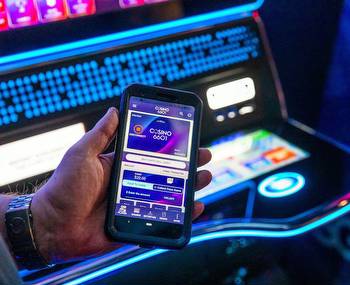Study: Internet Casino Gaming Can Boost Retail Casino Revenue

The Sports Betting Alliance released a study Thursday conducted by economists with the Analysis Group that showed land-based casino revenue growth rates increased by nearly two full percentage points among states where internet casino gaming is now available.
The study also noted total gaming revenue had increased by an average of 46% among the six states where internet casino gaming had been available prior to Rhode Island‘s launch earlier this month. Pennsylvania had the highest increase at 58.9% to $5.18 billion since adding internet casino gaming to its suite in 2018. New Jersey was second at 56.1% to $4.77 billion over an 11-year span dating to 2012, and Michigan was third at 47.8% to $4.4 billion since 2019.
The Analysis Group study also included its survey of nearly 2,400 people asking questions of their internet casino gaming and retail casino gaming preferences. The survey showed a majority of respondents in the six states where iGaming is available had not decreased their retail casino wagering — both in terms of visit frequency and spend — after starting internet casino gaming, and 26.5% of people reported visiting land-based casinos more frequently after their first digital internet casino experience.
The study also focused on the five states — Maryland, New York, Illinois, Louisiana, and Virginia — where legislation has been filed to add internet casino gaming. In the case of Maryland, the Analysis Group projected a $224 million increase in land-based casino revenue as part of a 91% increase in revenue to $3.9 billion by 2029.
It is the second study in as many months touting the potential of internet casino gaming as a bottom-line booster to brick-and-mortar venues. Eilers & Krejick Gaming released a study commissioned by IDEA Growth in February suggesting fears of casino cannibalization by internet casino gaming are unfounded and that casino revenue increased by 2.44% per quarter following the introduction of mobile casino apps.
A look at states with internet casino gaming
The Analysis Group methodology used an interrupted time series (ITS) approach to estimate changes in total revenue associated with internet casino gaming. It projected the compound annual growth rate (CAGR) prior to the states introducing online casino offerings and then compared CAGR after its introduction.
There are drawbacks to this method, including the lack of separation among differentials in each vertical and the inability to separate “the effects of introducing iGaming versus other growth in the economy or the casino market over time.”
A common thread among the six states was a lack of pronounced land-based growth in casino revenue. Three states were showing a pattern of decline in revenue, and no state showed even a 1% annual increase.
New Jersey’s internet gaming provided the biggest impact with a positive swing of 12.2 percentage points, with iGaming providing a 4.1% CAGR increase from 2012-23 in contrast to the minus-8.1% CAGR decrease from Atlantic City venues from 2009-12.
Michigan had a 10-point increase to 10.3% with a baseline of 2019, while Pennsylvania CAGR improved 9.1 percentage points to 9.7% dating back to its launch of internet casino gaming in July 2019. Delaware was the only state that continued to have negative revenue growth, but the study showed online casino rating slowed the rate of decline from 3.2% to 0.7%. It is also the only state where iGaming is run by a single operator, with the First State switching to BetRivers from 888 Holdings at the beginning of the year.
Probing the survey results
In comparing states with internet casino gaming against the five studied where legislation has been filed that could legalize it, all five showed a substantial majority of respondents would not decrease the frequency of their visits if internet casino gaming was legal. The five-state average of respondents who would either go more frequently or stay the same was 77.4%.
Among those, 28.3% said they would go more frequently, with New York having the highest percentage of such respondents (31.7%) and Illinois the lowest (23.3%). Maryland had the highest percentage of respondents who would go to casinos less frequently at 22.7%, and it was the only state where more than 1 in 5 said they would decrease the frequency of their visits.
In terms of the amount spent in land-based casinos, respondents in projected legalized states rated slightly higher in terms of increased amounts at 28.6% compared to 26.1% where it is already available. Virginia this time led the respondents among the five projected states at 31%, closely followed by New York at 30.5%.
Maryland respondents led the group who would likely lessen their spend at land-based casinos at 22.7%, notably above the 16.9% among states with internet casino gaming and well above the five-state average of 16.5%.
Projected revenue boosts for states that could legalize
For the five states that were considering legalizing iGaming, projected five-year revenue totals from 2025-29 ranged from $3.88 billion in Louisiana to $18.06 billion in New York. Four of the five states would average $1 billion in annual internet casino revenue over that five-year span, with New York’s $3.6 billion nearly double that of the next-closest state — Illinois at $1.86 billion.
In turn, revenue increase projections for land-based casinos ranged from 1.7% in Louisiana to 20.4% in Virginia, with an overall average of 6.6%. It should be noted Virginia currently has only three casinos in operation and the Analysis Group study also noted the linear growth in video gaming terminal (VGT) revenue in Illinois versus land-based casinos, with VGTs expected to generate an average of $1.07 billion more revenue annually.


































